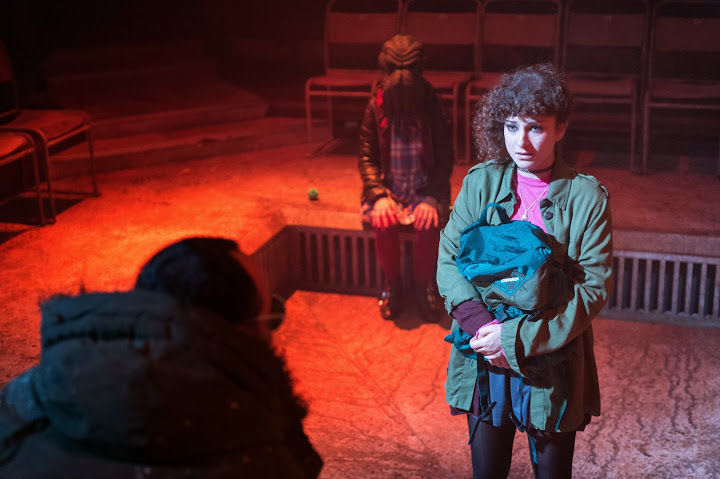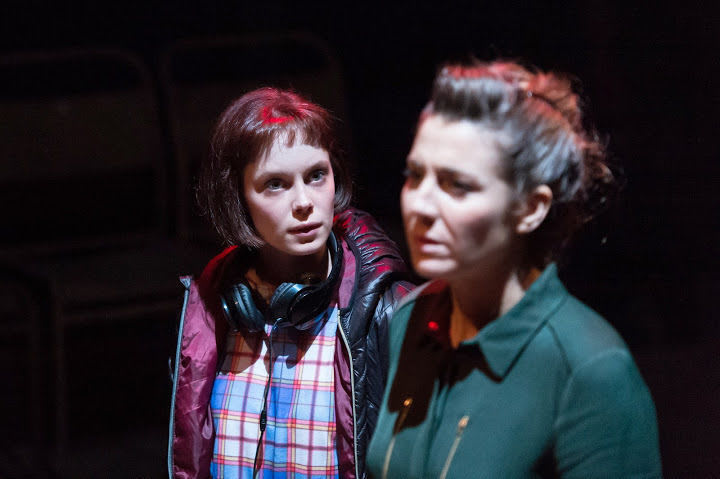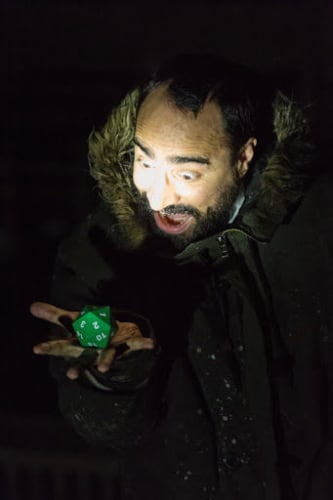Writer Alistair McDowall, writing for The Guardian Theatre blog on 6 November, states that "it’s rare to see a play that feels truly woven into the vast cultural network we inhabit", referring to the need for more plays about the Internet, media and technology.
This is the premise of his new play Pomona, staged early this year at The Royal Welsh College of Music and Drama on one date and now at the Orange Tree Theatre. Pomona, the Roman Goddess of fruit and trees, is, in the play, a place in the middle of the town ("A hole. A hole in the middle of the city. Looks like what the world’ll be in a few thousand years") which seems to exemplify Baudrillard’s hyper-reality, the conception of a world without clear distinction between reality and non-reality because in laymen’s terms, we are all dominated by simulacra, and victims of processes of simulation.
This is by far a less obvious version than The Matrix, though. Part virtual quest game, part mystery drama, part urban dystopia, it all starts with Ollie (Nadia Clifford) looking for her missing sister and talking to gangster-type Zeppo (Guy Rhys), who allegedly owns the city and, while eating chicken McNuggets, finely engages in pseudo-existentialistic urban claptrap.
The audience is aware that is something ‘unreal’ and odd about this scene when you see a petite, clearly feminine character wearing a Cthulhu mask (Sarah Middleton) and Ollie throwing multi-sided dice at her. The rest of story is told back in reverse, in a narrative strategy that at first confuses and later shows the interconnectivity between the short-cuts, the different story-lines, the underground world of prostitution, of criminality, of violence and obviously of missing girls.
Built around the motif of disappearance and displacement, it is a clever script that just startles long enough not to make you feel at total loss and once you work out the connections between the two young security guards, Charlie (Sam Swann) and Moe (Sean Rigby), the prostitute single mother Fay (Rebecca Humphries), the bordello’s owner, Gale (Grace Thurgood) and the creepily geeky, reticent Keaton, it is a safe enough challenge.
The success of this production is in the fast-paced directing of Ned Bennett, who has worked out how to enter and interpret the world of the play with fierce physicality and theatrical sensibility.
The Orange Tree Theatre stage is transformed into a caved-in rectangle with a round drain in the middle, where the action whirls around, in the middle of it and in off-stage darkness. It is a brilliant use of space by the cast, who with perfect timing and agility can follow the brilliantly choreographed sections by movement director Polly Bennett. Those where all performers walk up and down the stage talking us through their quests with a sense of heightened immediacy are possibly the best moments in the production.
There is, also, some poignant lighting work by Elliot Griggs. The sudden blackouts are not at all awkward but, combined with softer light transitions, add to the unhinged surreal quality of the production. If the text is fragmented at times, the dialogues and longer expositions feel always true and, like in other McDowall plays, there is some light-hearted, slightly juvenile humour that well compensates the perverse darkness that builds a vision of a hopeless society.
It is the lost world of a youth unguarded by an urban evil that is both hidden and omniscient. It is hard to say whether this play, together with more recent productions, is showing some new directions in British social drama in the footstep of much of European counterparts or is the context of the media-generated virtual that makes the surreal, hyper-real, and the use of a fragmented narrative plausible. I wonder.
Beyond this, and some more conservative opinions, this production is a must–see for all those who love a full theatrical experience where there is nothing obvious about its social and cultural references.


